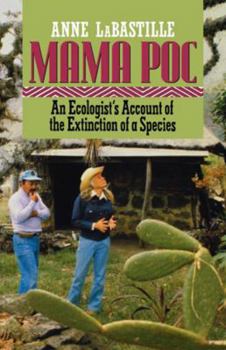Mama Poc: An Ecologist's Account of the Extinction of a Species
Select Format
Select Condition 
Book Overview
Every day some species of plant or animal on our planet becomes extinct. In Mama Poc, the bestselling author of Woodswoman and Beyond Black Bear Lake relates her own attempts to halt the decline of a single species of bird found only in Guatemala. The giant grebe, a flightless bird living on mile-deep Lake Atitlan, came to LaBastille's attention in 1964. Her population count revealed that a mere eighty-two birds remained. Over the course of twenty-five...
Format:Paperback
Language:English
ISBN:0393308006
ISBN13:9780393308006
Release Date:September 1991
Publisher:W. W. Norton & Company
Length:320 Pages
Weight:0.90 lbs.
Dimensions:0.9" x 5.5" x 8.6"
Customer Reviews
3 ratings
Best of the Best
Published by Thriftbooks.com User , 21 years ago
Of all Anne LaBastille's books, this is my favorite. She practices what she preaches and heads to South America where she documents the extinction of a species. Her compassion for the environment coupled with her own personal narrative make for very compelling reading.The only thing I do not understand is why so many of her books are out of print. The Woodswoman series should be required reading in college courses and Mama Poc should be read by anyone that cares about the environment.
Behind the extinction of a species
Published by Thriftbooks.com User , 23 years ago
Every year, newspapers dole out articles about the endangered or even extinction of a species somewhere on the globe. Yet, few describe the multitude of reasons for this event, much less the brave people who fight the battles. Dr. Anne LaBastille's, "Mama Poc" details the myriad of mistakes and consequences of the now extinct Atitlan giant grebe. Starting over 25 years ago, Dr. LaBastille started a one-person movement to save a rare species of a water bird on a large volcanic lake in the middle of Guatemala. A modern day Dr. Livingston, Anne LaBastille dealt with local residents of Lake Atitlan, the Guatemalan government and dozens of foundations to obtain the necessary grants. These were not just to save a bird species, but a large recreational lake, a way of life and the residents livelihood. The author has woven a personal memoir detailing the dilemmas of her work. Far from a flat testimonial, one reads about the friends and coworkers that befriended Dr. LaBastille during her years of research. It is a personal story as well as a brilliant documentary of her research filled with stories of earthquakes, revelations, periless lake storms, successes, political guerillas, murder and love. At first the reader may wonder why on earth someone would go through all this trouble to save a water bird. By the end of the first chapter you will find yourself cheering for the underdog with all the odds stacked against her. The Smithsonian Institution's Thomas E. Lovejoy summed it all up in the 'forward'. "The measure of our success will be in the number of species that survive. They will also be our reward". Well said.
A tale of extinction told in a moving, but unsentimental way
Published by Thriftbooks.com User , 26 years ago
Among all the tales of commitment to a cause, personal loss, and bravery to face the world despite the heartbreaks it brings, Anne LaBastille's story of the decline and eventual extinction of the giant pied-billed grebe of Guatemala's Lake Atitlan is a winner. Beginning with the author's arrival at the lake in 1965, the memoir-cum natural history tells the saga of how the young naturalist came to fall in love with the most engaging of the country's water birds and its surroundings, and how against the odds of weather, earthquakes, and political turmoil, she and her Guatemalan cohorts documented the gradual erosion of the species's habitat over the subsequent two and a half decades. LaBastille weaves together the story of losing a species with that of losing a lover and friends, so that we feel her grief in both personal and professional domains. At the same time, she keeps enough distance so that we learn the facts of the case with its details of over-development and careless management of the lake's assets that contributed to the final loss of a species. Although we know the outcome of her story from page one, her suspenseful account leaves us hoping for a different ending right up until the last sentence. LaBastille blames no one cause, but her tale makes it clear that the the giant grebe's fate was not inevitable.





